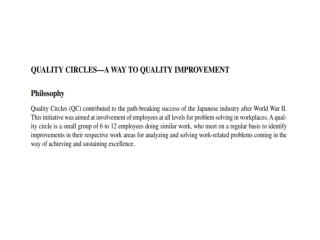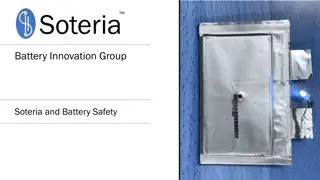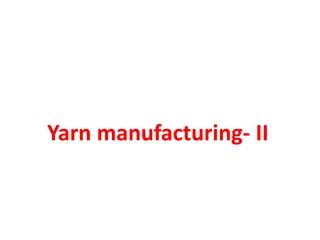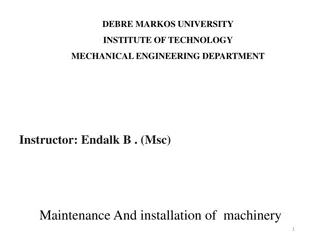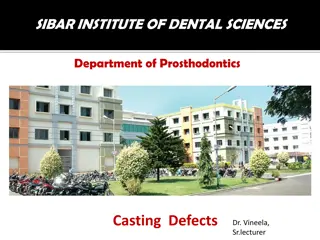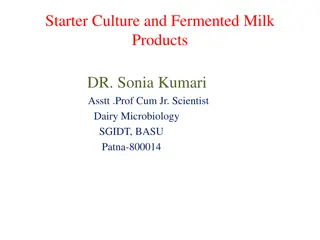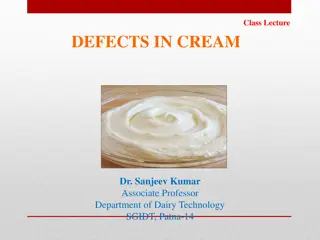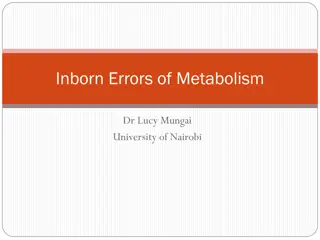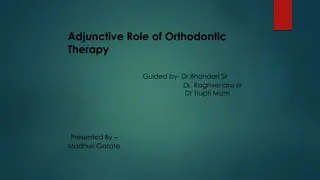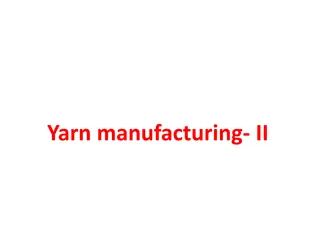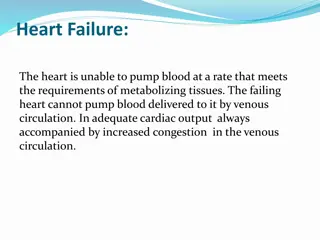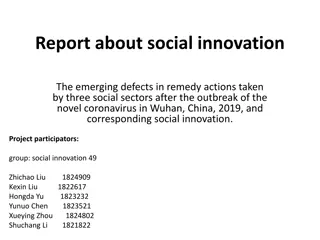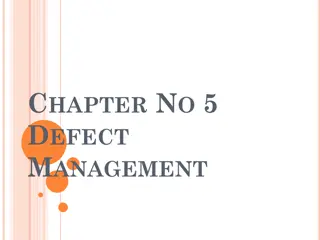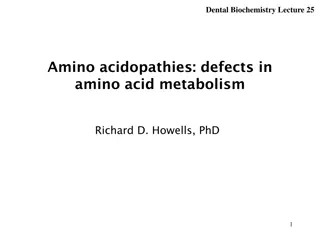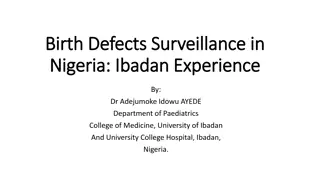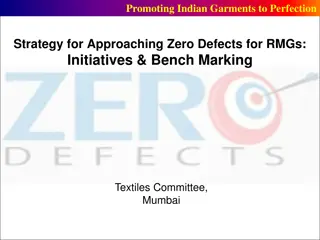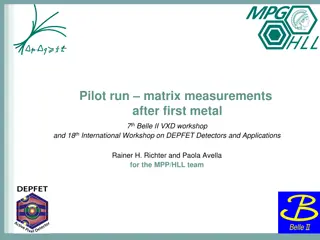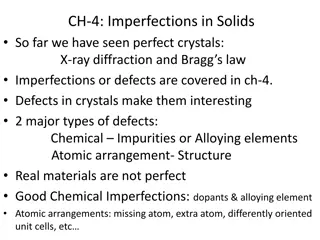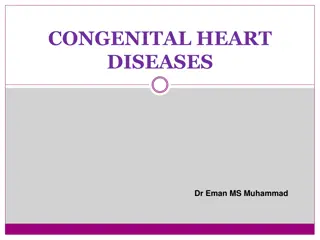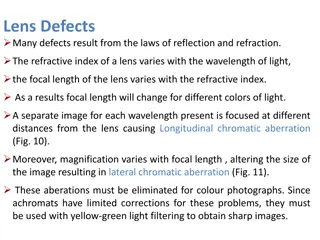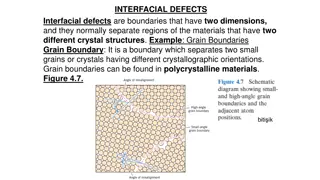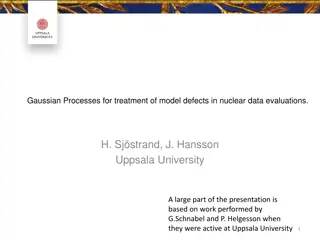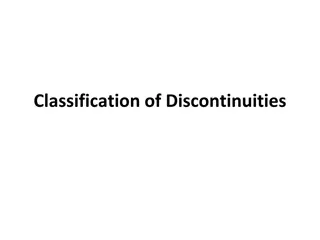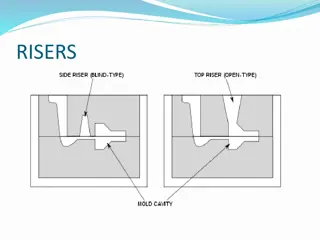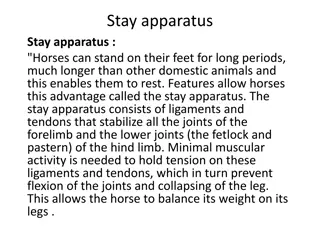Zero Defects Philosophy in Quality Management
Zero Defects Philosophy is a key principle in Total Quality Management, advocating for perfection in products and processes by eliminating defects completely. Philip Crosby popularized this concept, emphasizing that defects are never acceptable. Key concepts include "Quality is Free" and "Do It Righ
0 views • 19 slides
Lithium-ion Battery Fire Risks and Safety Measures
Lithium-ion batteries pose significant fire hazards due to factors like flammable materials, manufacturing defects, and charging accidents. The frequent incidents of battery fires in various industries highlight the pressing need for improved safety measures. Current solutions, though existing, are
1 views • 12 slides
Software Engineering and Architecture
Reliability in software systems is crucial, as defects can lead to failures impacting reliability. The number of defects directly affects the system's reliability. Not all defects are equal, so prioritizing defect correction based on return on investment is essential. Testing thoroughly, especially
1 views • 40 slides
Raise Awareness for World Birth Defects Day 2024 with WBDD Toolkit
World Birth Defects Day (WBDD) on March 3rd aims to spread awareness and improve care for individuals with birth defects. The WBDD 2024 Toolkit provides resources, challenges, and suggested activities to help you participate and raise awareness. Join the movement by sharing your story and advocating
6 views • 15 slides
Ensuring Reliability of Deep Neural Network Architectures
This study focuses on assuring the reliability of deep neural network architectures against numerical defects, highlighting the importance of addressing issues that lead to unreliable outputs such as NaN or inf. The research emphasizes the widespread and disastrous consequences of numerical defects
0 views • 26 slides
Understanding Yarn Manufacturing: Processes and Defects in Drafting Zone
Yarn manufacturing involves various processes like drawing, doubling, and drafting to improve fiber alignment and quality. Defects in the drafting zone such as roller slip and drafting wave can impact the yarn production process. Roller setting plays a crucial role in maintaining the correct nip-to-
2 views • 19 slides
Common Damages in Machine Parts and Bearings
Sliding bearings and anti-friction bearings in machinery often experience wear, fatigue, and various damages due to factors like lubrication, alignment, and applied loads. The process of wear is influenced by wear velocity, operation conditions, and foreign substances, leading to overheating and cha
0 views • 34 slides
Quality Control and Monitoring Procedures in Construction Projects
Quality control and monitoring procedures in construction projects play a crucial role in ensuring the quality and safety of structures. The process involves identifying defects, carrying out tests, correcting defects within specified timeframes, and taking measures in case of non-compliance. Engine
0 views • 6 slides
Understanding Title Defects in Real Estate Closings
Marketable title signifies a clear ownership chain, insurable title allows for insurance coverage against known defects, while apparent and real breaks in title require different resolutions to ensure a property's marketability. Dealing with title defects is crucial in real estate transactions to sa
0 views • 14 slides
Common Casting Defects in Prosthodontics: Causes and Prevention
Casting defects in prosthodontics can result from errors in the casting procedure, leading to issues like distortion, surface roughness, porosity, and incomplete detail. Various causes such as stress relaxation during wax pattern preparation can contribute to distortion, while factors like air bubbl
5 views • 27 slides
Understanding Starter Culture Defects in Fermented Milk Products
Common problems with starter cultures in fermented milk products include insufficient acid and flavor production, as well as various defects like sharp acid taste, malty flavor, metallic flavor, green flavor, flat flavor, and bitterness. Factors contributing to these issues range from milk quality t
1 views • 9 slides
Classification and Genetic Defects of Diabetes
The diagnosis and differential diagnosis of Type 1 and Type 2 diabetes are discussed, detailing the clinical courses, age of onset, body weight characteristics, onset patterns, and genetic factors. The etiologic classification of diabetes including insulin-deficient, immune-mediated, monogenic, and
0 views • 16 slides
Understanding Cream Defects: Causes, Prevention, and Interpretation
Dive into the world of cream defects with insights from Dr. Sanjeev Kumar, an Associate Professor in Dairy Technology. Explore the relation between microbiological quality and interpretation results, understand flavor defects in market cream, and learn about miscellaneous defects like feathering in
1 views • 10 slides
Understanding Inborn Errors of Metabolism and Metabolic Disorders
Inborn Errors of Metabolism (IEM) are genetic disorders that disrupt metabolic pathways, leading to substrate accumulation or product deficiency. These disorders can be classified based on toxic accumulation, protein metabolism, carbohydrate intolerance, lysosomal storage issues, energy production d
0 views • 29 slides
Adjunctive Role of Orthodontic Therapy: Benefits and Applications
Orthodontic therapy plays a crucial role in improving periodontal and osseous defects in adult patients, along with aiding in restorative treatments like implant placement and tooth restoration. This treatment modality can align crowded anterior teeth, reposition teeth to correct defects, and enhanc
0 views • 34 slides
Understanding Casting Defects in Metal Casting Processes
A casting defect is an undesirable irregularity in metal casting processes that may require correction or elimination. This article discusses the definition, types, remedies, causes, prevention, and conclusion of casting defects. It covers shrinkage defects, gas porosity, pouring metal defects, meta
0 views • 21 slides
Understanding Yarn Manufacturing Process: Drafting, Defects, and Modern Systems
Explore the intricate process of yarn manufacturing, including drafting techniques, common defects like roller slip and drafting wave, roller setting importance, modern drafting systems such as MDS, and the role of electrical and mechanical stop motions in maintaining quality production.
0 views • 19 slides
Studies on Defects in ZnO Nanowires and Their Impact on Properties
In this research, various aspects of defects in ZnO nanowires are explored, including their formation through heating and ion bombardment, as well as the role of contacts. The investigation delves into the growth, control, and motivation of defects, showcasing the effects of processes like argon bom
0 views • 8 slides
Understanding Heart Failure and Congenital Heart Diseases
Heart failure is a condition where the heart struggles to pump blood efficiently, leading to various complications. It can affect different sides of the heart, with causes ranging from coronary artery disease to valve problems. Congenital heart diseases, on the other hand, are common anomalies prese
0 views • 19 slides
Understanding Regenerative Osseous Surgery in Periodontal Therapy
Regenerative osseous surgery is a procedure aimed at reshaping the alveolar bone to correct deformities caused by periodontal disease. This comprehensive guide covers the definition, types, indications, and contraindications of osseous surgery, emphasizing the goal of achieving ideal periodontal reg
0 views • 26 slides
Predictive Visualisation of Fibre Laser Machining via Deep Learning
Laser cutting is a fast and precise method, but predicting defects can be challenging. This study explores using Deep Learning to model and forecast laser cutting defects based on parameters. Topics include introduction to laser cutting, deep learning, imaging, and conclusions.
2 views • 20 slides
Addressing Emerging Defects in Social Sectors Post Novel Coronavirus Outbreak in Wuhan: A Study on Social Innovation
The study delves into the emerging defects in remedial actions taken by social sectors - governance, media, and healthcare - post the COVID-19 outbreak in Wuhan. It highlights issues like insufficient medical supplies reserve, lack of coordinated information dissemination by media, and gaps in the h
0 views • 33 slides
Understanding Software Defect Management
Defects in software arise from various causes such as miscommunication, lack of experience, human factors, and poor testing skills. Different types of defects can be classified based on severity, work product, type of error, and status. Severity-wise classification includes major, minor, and fatal d
0 views • 30 slides
Overview of Amino Acidopathies in Dentistry: Defects in Amino Acid Metabolism
This lecture discusses the various amino acidopathies, including phenylketonuria, albinism, alkaptonuria, maple syrup urine disease, and homocystinuria. It covers the metabolic defects in amino acid metabolism, symptoms, causes, and treatment methods for these disorders. Emphasizing the importance o
0 views • 19 slides
Birth Defects Surveillance in Nigeria: Ibadan Experience - Overview and Team Members
Dr. Adejumoke Idowu Ayede shares insights on Birth Defects Surveillance in Nigeria with a focus on the Ibadan Experience. The outline highlights the twin institutions involved, strategies for group establishment, baseline data collection, and immediate next plans. The team members from various speci
0 views • 22 slides
Understanding Birth Defects: An Overview of Congenital Anomalies
Birth defects refer to abnormalities present in babies at birth, regardless of genetic or prenatal causes. They affect 2-3% of babies in the US, making them a leading cause of infant mortality. Structural defects like cleft lip/palate, spina bifida, and club foot can impact a child's health and deve
0 views • 17 slides
Efficacy and Toxicity of Carboplatin in the Treatment of Canine Non-Osseous Sarcomas
The study evaluates the efficacy and toxicity of carboplatin in treating macroscopic non-osseous sarcomas in dogs. The research focuses on soft tissue sarcomas (STS) and mesenchymal tumors, exploring carboplatin's limitations, response rates, and toxicity profiles. Aimed at determining the drug's ef
0 views • 15 slides
Establishing a Surveillance System for Birth Defects in Malawi
This project focuses on establishing a surveillance system for major external birth defects in Malawi, with objectives including determining baseline prevalence, describing population characteristics, and comparing outcomes among HIV-positive and negative women. Implementation involves dedicated pro
0 views • 12 slides
Enhancing Indian Garment Quality: Zero Defect Strategy & Initiatives
Promoting Indian Garments to Perfection outlines a comprehensive strategy for approaching zero defects in the manufacturing of ready-made garments (RMGs). The presentation covers proposed initiatives, the importance of RMGs in the textile industry, and a vision and mission focusing on achieving glob
0 views • 30 slides
Abdominal Wall Defects: Omphalocele and Gastroschisis Overview
Abdominal wall defects such as omphalocele and gastroschisis are congenital conditions where abdominal organs protrude through an unusual opening in the abdomen. These defects result from disruptions during embryonic development, leading to serious implications for affected individuals. Different ty
1 views • 42 slides
Matrix Measurements and Analysis After First Metal Workshop
The pilot run matrix measurements were conducted following the 7th Belle II VXD workshop and the 18th International Workshop on DEPFET Detectors and Applications by Rainer H. Richter and Paola Avella for the MPP/HLL team. The measurements included assessing defects, diode integrity, metal shorts, an
0 views • 30 slides
Understanding Imperfections in Solids
Imperfections or defects in crystals introduce intriguing properties to materials. This chapter explores two major types of defects - chemical impurities/alloying elements and atomic arrangement anomalies. Imperfections play vital roles in altering material properties, such as in semiconductors and
0 views • 18 slides
Understanding Software Quality Assurance & Testing
Software Quality Assurance (SQA) aims to identify and rectify defects in software to meet user expectations. Defects can range from functional issues to security vulnerabilities, and the longer they persist, the costlier they become. SQA must be integrated throughout the software development life cy
0 views • 25 slides
Overview of Congenital Heart Diseases
Congenital heart diseases are abnormalities in the heart's structure present at birth. Factors like viral infections, genetic conditions, and maternal health contribute to these conditions. There are non-cyanotic and cyanotic classifications based on shunting patterns. Examples include atrial septal
0 views • 36 slides
Understanding Lens Defects and Aberrations in Optics
Lens defects and aberrations in optics, such as chromatic and spherical aberrations, are caused by the laws of reflection and refraction. They lead to issues like longitudinal and lateral chromatic aberration, as well as spherical aberration. Proper correction methods, like using achromats with yell
0 views • 24 slides
Understanding Interfacial Defects and Microscopy in Materials Science
Interfacial defects are boundaries separating regions with different crystal structures, like grain boundaries in polycrystalline materials. Microscopic examination distinguishes between macroscopic and microscopic dimensions, analyzed through optical and electron microscopy methods. Electron micros
0 views • 9 slides
Gaussian Processes for Treatment of Model Defects in Nuclear Data Evaluations
Gaussian Processes (GP) are explored for treating model defects in nuclear data evaluations. The presentation discusses the impact of model defects on evaluation results and proposes using GP to address these issues. The concept of GP and its application in treating model defects are detailed, highl
0 views • 28 slides
Understanding Classification of Discontinuities in Metal Processing
Classification of discontinuities in metal processing involves identifying interruptions in the normal physical structure, such as cracks, seams, and inclusions, which may or may not be defects. Discontinuities can be surface or subsurface, with surface ones being more likely harmful. The origins of
0 views • 29 slides
Understanding Risers and Casting Defects in Metal Casting Process
Risers are crucial in reducing shrinkage problems during casting by promoting directional solidification. Open versus blind risers have distinct characteristics affecting feeding and positioning within the mold. Rapid cooling rate and use of insulating compounds impact the efficiency of casting, whi
0 views • 41 slides
The Anatomy of Horses and Domestic Ruminants
Horses possess a unique stay apparatus that allows them to stand for long periods with minimal muscular activity, while domestic ruminants like cows, sheep, and goats have osseous horns that grow continuously. The stay apparatus in horses consists of ligaments and tendons stabilizing their joints, e
0 views • 6 slides
